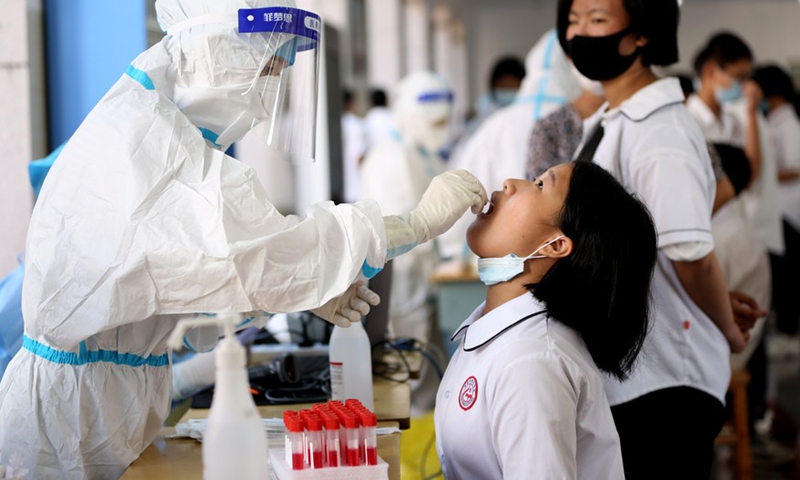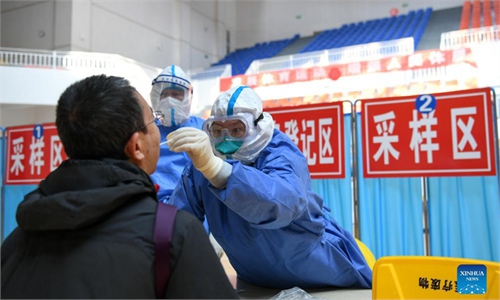Four of 19 regions affected by latest flare-up report outbreaks at schools and kindergartens

A medical worker collects a swab sample from a student for nucleic acid testing at No. 9 middle school in Longyan, southeast China's Fujian Province, Sep 15, 2021.Photo:Xinhua
The latest resurgence of COVID-19 in China has shown an apparent tendency of spreading among schools, affecting students and kindergarten children, as at least four places have detected outbreaks related with schools and kindergartens.
Experts called for faster vaccination of minors so as to raise students' resistance to the virus as well as the strengthened monitoring of travel routes of parents and teachers to prevent potential flare-ups that could lead to larger-scale outbreaks among communities.
New local infections in border city Heihe, Heilongjiang Province, have remained high over the past few days and hit a record of 44 cases on Wednesday in the latest flare-up, the provincial health authority announced on Thursday.
The cumulative number of confirmed domestically transmitted cases in the province reached 189, of which 184 were from Heihe. At least 20 confirmed cases in Heihe have some relation with schools and kindergartens, affecting at least one primary school and two kindergartens. A local university - Heihe College - was closed after 10 close contacts were found, local authorities said on Monday.
Two sites of outbreaks in Hebei Province - Xinji and Shenze - were also found to have been related with schools and kindergartens. On Wednesday, Hebei found 23 new confirmed cases, 20 from Shenze county and the other three from Xinji.
Students were among the 20 confirmed cases in Shenze, with the youngest said to be 2 years old. The other three from Xinji were all 11-year-old students at an elementary school.
Gansu, which reported at least 12 confirmed cases among students, suspended in-person classes in 10,818 schools and kindergartens - 62 percent of the total local schools. The move affected 2.84 million students and 250,000 teachers.
All universities in Gansu will be under closed-loop management.
Beijing's Chaoyang district also suspended classes at 18 schools after outbreaks of confirmed cases recently.
Zhang Yuexin, an expert on epidemic prevention and control, told the Global Times on Thursday that epidemic resurgences relating to schools should draw greater attention because infections of students could easily lead to transmission among communities. As young people have relatively lower vaccination rates, they could be naturally more vulnerable to the virus.
The epidemic related to schools serves as a warning to the public that loopholes might exist in preventing outbreaks at schools. Monitoring the health of teachers and parents is just as important as monitoring the health of students, Zhang said, noting that vaccination of minors should be accelerated.
A forecast system developed by Lanzhou University showed that the epidemic in Heihe would continue to develop. Under the current control measures, the outbreak will be controlled before November 17 and the cumulative confirmed cases will reach between 242 and 446, the Global Times learned from its projection.
Zhang said as long as no new confirmed cases were found from places beyond quarantine venues within 14 days, local outbreaks could be controlled within a month.
The recent flare-ups have spread to 19 provincial-level regions with more than 700 confirmed cases reported within a month.
As local governments are grappling with these outbreaks, the National Immigration Administration urged border ports to strengthen epidemic prevention and control, such as using contactless methods for dealing with imported goods and intensifying border patrols to crack down on illegal border crossings.
Experts had warned there are two possible channels that can provide transmission chains for the virus from abroad - land border ports with cross-border trade, or places where migrating wild animals can cross the border.

A medical worker collects a swab sample from a student for nucleic acid testing at No. 9 middle school in Longyan, southeast China's Fujian Province, Sep 15, 2021.Photo:Xinhua
The latest resurgence of COVID-19 in China has shown an apparent tendency of spreading among schools, affecting students and kindergarten children, as at least four places have detected outbreaks related with schools and kindergartens.
Experts called for faster vaccination of minors so as to raise students' resistance to the virus as well as the strengthened monitoring of travel routes of parents and teachers to prevent potential flare-ups that could lead to larger-scale outbreaks among communities.
New local infections in border city Heihe, Heilongjiang Province, have remained high over the past few days and hit a record of 44 cases on Wednesday in the latest flare-up, the provincial health authority announced on Thursday.
The cumulative number of confirmed domestically transmitted cases in the province reached 189, of which 184 were from Heihe. At least 20 confirmed cases in Heihe have some relation with schools and kindergartens, affecting at least one primary school and two kindergartens. A local university - Heihe College - was closed after 10 close contacts were found, local authorities said on Monday.
Two sites of outbreaks in Hebei Province - Xinji and Shenze - were also found to have been related with schools and kindergartens. On Wednesday, Hebei found 23 new confirmed cases, 20 from Shenze county and the other three from Xinji.
Students were among the 20 confirmed cases in Shenze, with the youngest said to be 2 years old. The other three from Xinji were all 11-year-old students at an elementary school.
Gansu, which reported at least 12 confirmed cases among students, suspended in-person classes in 10,818 schools and kindergartens - 62 percent of the total local schools. The move affected 2.84 million students and 250,000 teachers.
All universities in Gansu will be under closed-loop management.
Beijing's Chaoyang district also suspended classes at 18 schools after outbreaks of confirmed cases recently.
Zhang Yuexin, an expert on epidemic prevention and control, told the Global Times on Thursday that epidemic resurgences relating to schools should draw greater attention because infections of students could easily lead to transmission among communities. As young people have relatively lower vaccination rates, they could be naturally more vulnerable to the virus.
The epidemic related to schools serves as a warning to the public that loopholes might exist in preventing outbreaks at schools. Monitoring the health of teachers and parents is just as important as monitoring the health of students, Zhang said, noting that vaccination of minors should be accelerated.
A forecast system developed by Lanzhou University showed that the epidemic in Heihe would continue to develop. Under the current control measures, the outbreak will be controlled before November 17 and the cumulative confirmed cases will reach between 242 and 446, the Global Times learned from its projection.
Zhang said as long as no new confirmed cases were found from places beyond quarantine venues within 14 days, local outbreaks could be controlled within a month.
The recent flare-ups have spread to 19 provincial-level regions with more than 700 confirmed cases reported within a month.
As local governments are grappling with these outbreaks, the National Immigration Administration urged border ports to strengthen epidemic prevention and control, such as using contactless methods for dealing with imported goods and intensifying border patrols to crack down on illegal border crossings.
Experts had warned there are two possible channels that can provide transmission chains for the virus from abroad - land border ports with cross-border trade, or places where migrating wild animals can cross the border.

